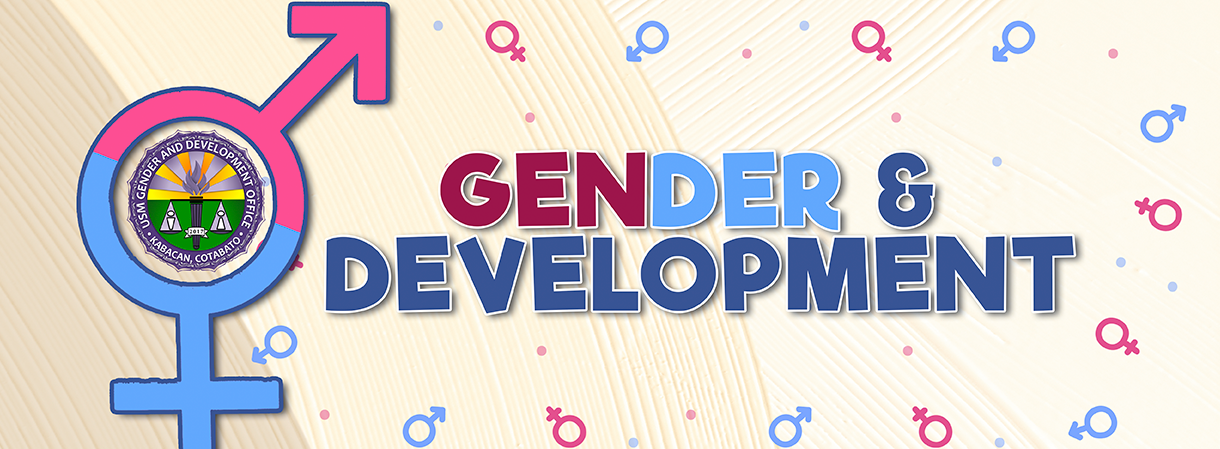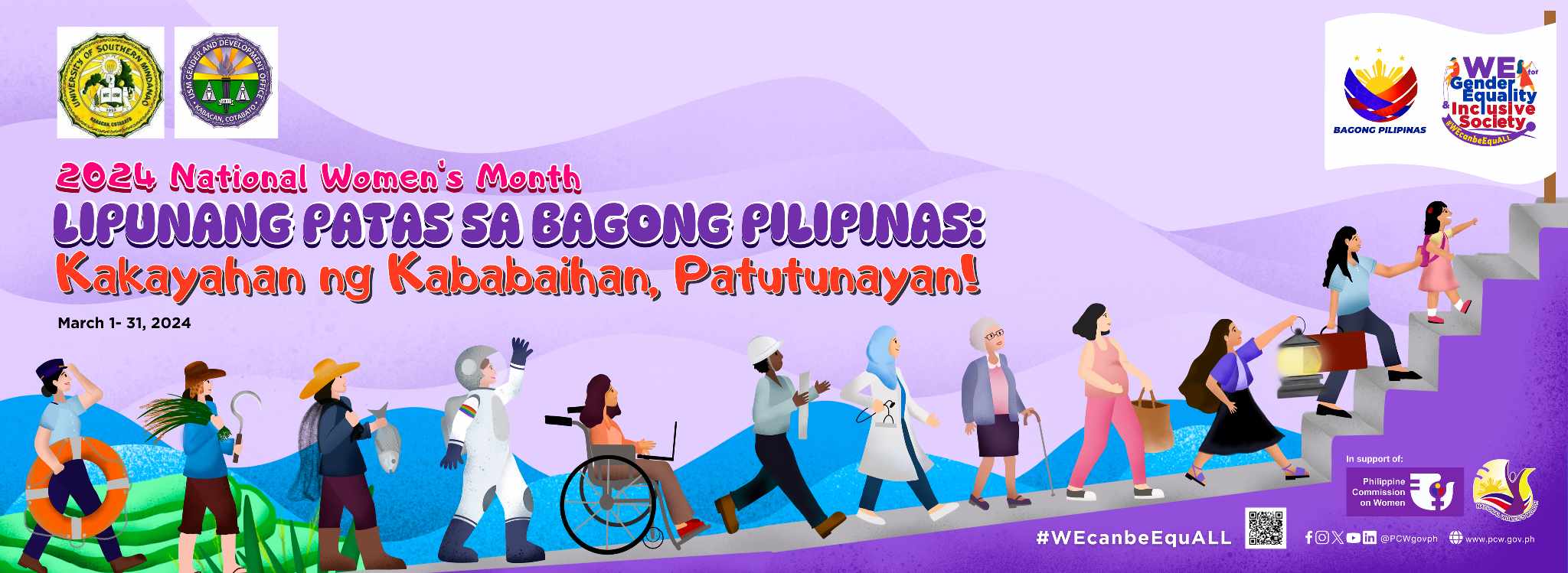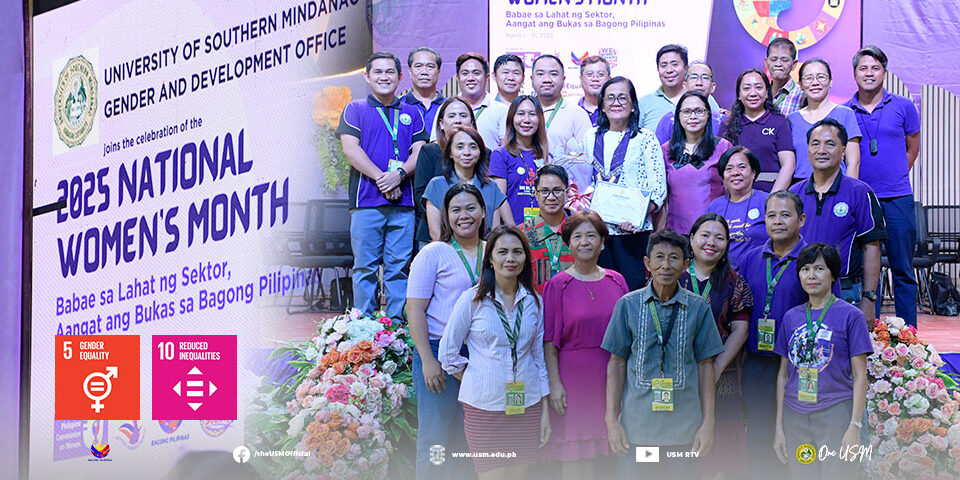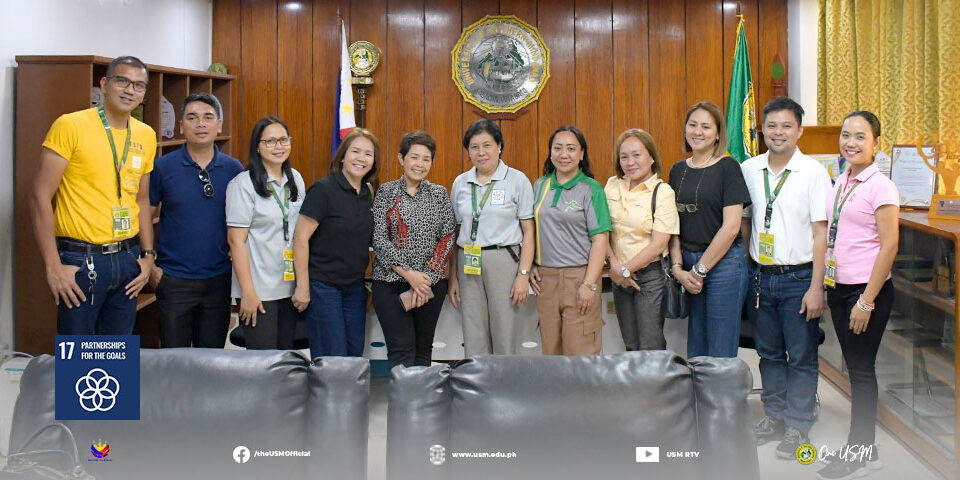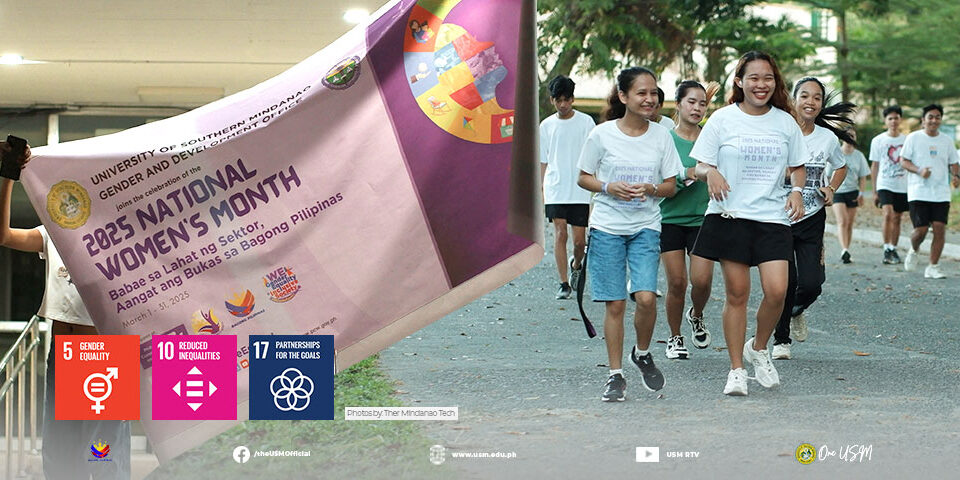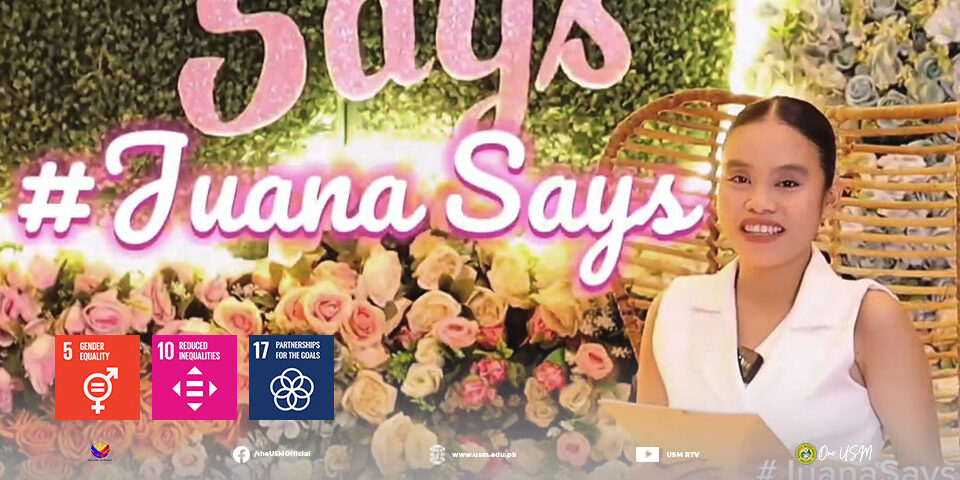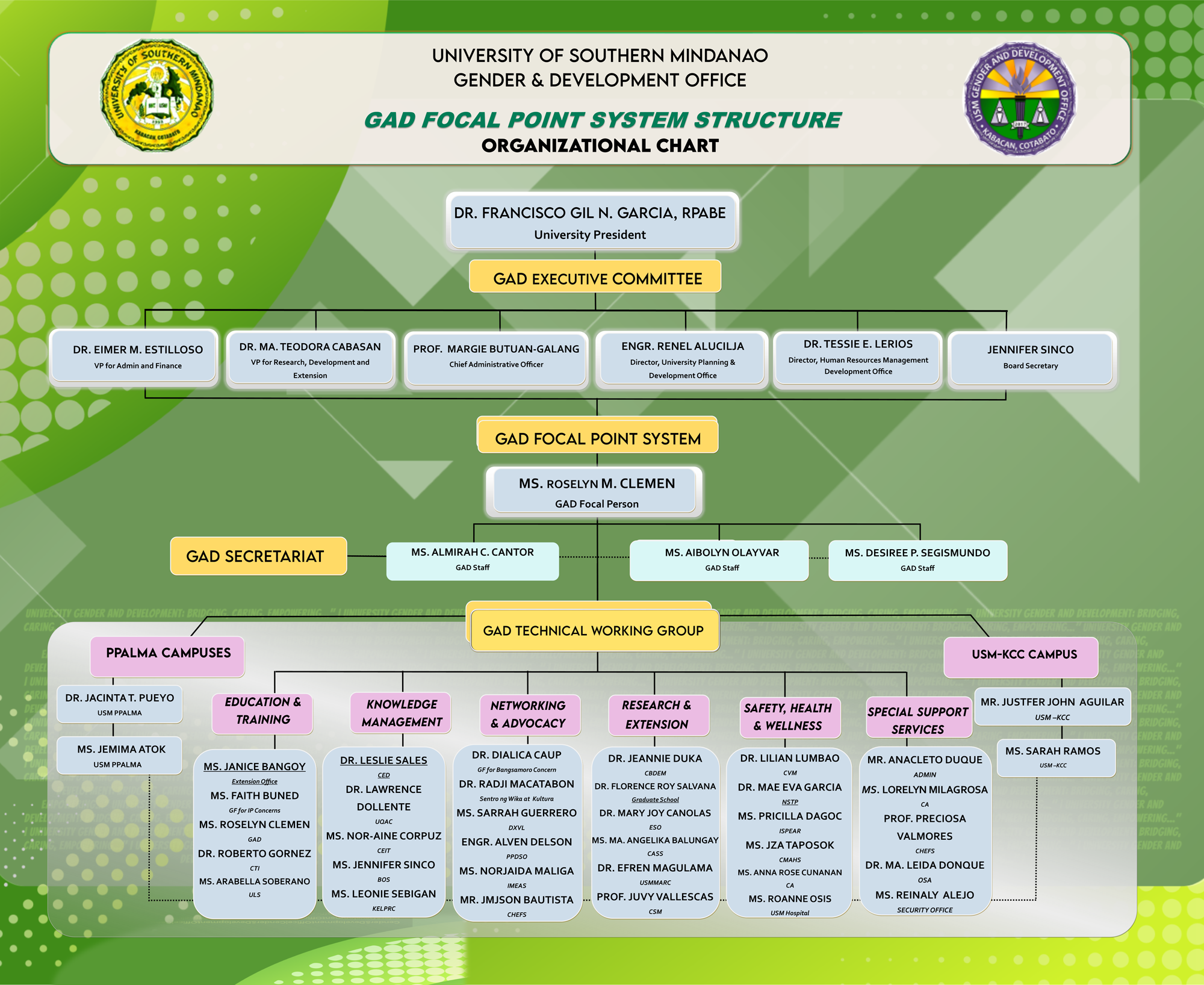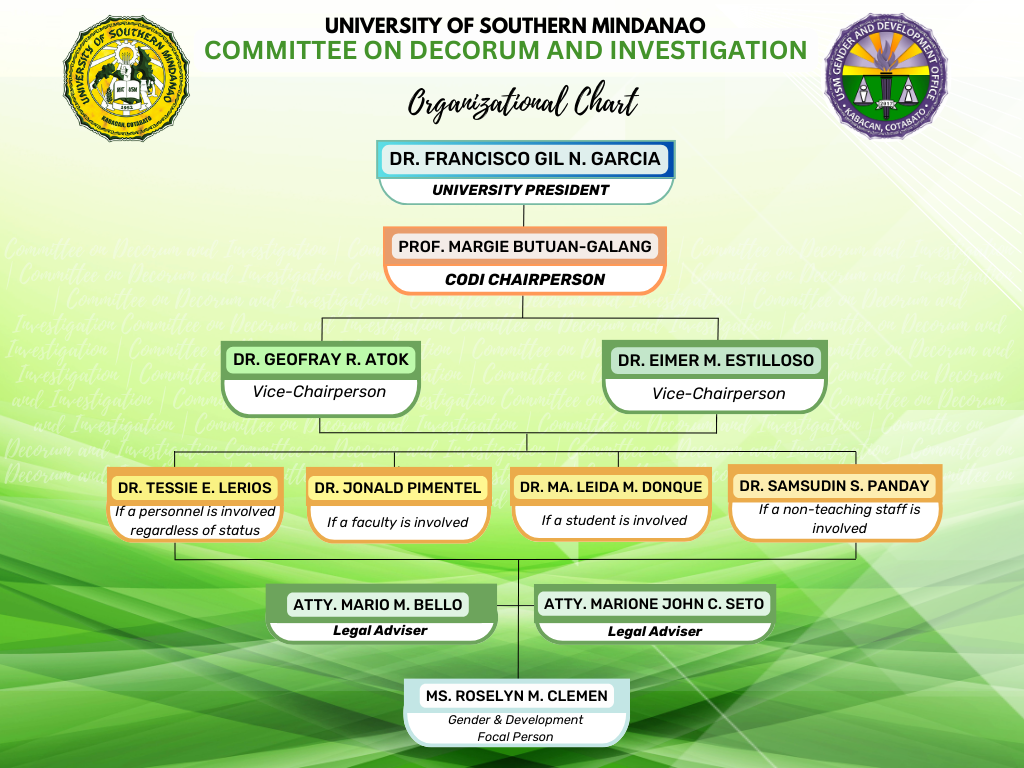Vision
To be a leading university in the region that actively cultivates gender equality and diversity in a bias-free, safe and supportive, gender-responsive and culture-sensitive learning environment.
Mission
- To advance Gender and Development Mainstreaming through relevant, equitable, collaborative and long-term initiatives, including programs, projects, and activities.
- To support the specific needs and interests of men and women, as defined by legal and institutional norms encompassing cultural, social, economic, and political aspects.
- To actively engage all USM stakeholders – officials, faculty, staff, students, and parents – in playing crucial roles to foster a gender-responsive and inclusive academic institution.
Goals
- To enhance equal access to resources of men and women in the USM community.
- To improve participation of women in the consultation process in the USM community.
- To enhance resiliency of men and women in the USM community.
- To empower and capacitate women to increase their participation in the leadership and decision-making in the university.
- To enhance gender mainstreaming of GAD Policy and program in the university..
CHED Memorandum No. 1 series of 2015 otherwise known as the “Establishing the Policies and Guidelines on Gender and Development in the Commission on Higher Education and Higher Institutions (HEIs)” which was adopted from the provisions of the Magna Carta of Women (RA 9710) defines Gender and Development Program as:
The development perspective and process that is participatory and empowering, equitable, sustainable, free from violence, respectful of human rights, supportive of self-determination and actualization of human potentials. It seeks to achieve gender equality as a fundamental value that should be reflected in development choices; seeks to transform society’s social, economic, and political structures and questions they validity of the gender roles they ascribed to women and men; contends that women are active agents of development and not just passive recipients of development assistance; and stresses the need of women to organize themselves and participate in political processes to strengthen their legal rights.
USM GAD
“USM GAD: Bridging, Caring, Empowering…”
USM GAD Agenda
- Increased awareness-raising, knowledge and participation of women in all aspects of development at all sphere.
- Sustainable interface with research, extension and development.
- Provision of special support services to stakeholders with special needs
Events
USM Celebrates National Women’s Month
The Gender and Development (GAD) office of the University of Southern Mindanao (USM) spearheaded the celebration of the 2025 National Women’s Month at the University Auditorium, USM, […]
USM Shares Insights to MSU-Gensan
The University of Southern Mindanao (USM) shared its best practices to the Directors and other personnel of the Mindanao State University- General Santos City (MSU-GSC) through […]USM GAD Organizes Fun Run for a Cause in Celebration of Women’s Month 2025
The University of Southern Mindanao – Gender and Development (GAD) Office conducted a Fun Run for a Cause on March 14, 2025, at USM, Kabacan, Cotabato, […]Empowering Women: USM GAD Set to Launch “Juana Says” Video Series
The University of Southern Mindanao (USM) Gender and Development (GAD) is about to launch “Juana Says”, a video production aimed at inspiring and empowering women, as […]
- United Nation Convention on the Elimination of all forms of Discrimination Against Women (UN CEDAW) – adopted by UN in 1979 and took effect on September 4, 1981.
- International Bill of Rights of Women – promotes equality in all fields; affirmative action for women and protection of women from violence.
- Beijing Platform for Action (BPFA)1995 – calls for action on 12 areas of concern affecting women and girl-children.
- Millennium Development Goals (MDGs) – are eight international development goals that all 192 member states of UN and at least 23 international organizations adopted during the 2000 UN Millennium Summit; aim to eliminate extreme poverty by 2015.
- Sustainable Development Goals (SDGs), also known as the Global Goals – adopted by all United Nations Member States in 2015 as a universal call to action to end poverty, protect the planet and ensure that all people enjoy peace and prosperity by 2030.
- 1987 Philippine Constitution – The state recognizes the role of women in nation building and shall ensure the fundamental equality before the law of women and men (Sec. 14, Art. 11).
- Laws on Gender Mainstreaming Enacted by Congress:
- Republic Act No. 7192 (1992) Women in Development and Nation Building Act – promotes the integration of women as full equal partners of men in development and nation building.
- General Appropriations Act (GAA) from 1995 to present – directs government agencies to formulate a Gender and Development (GAD) plan, the cost of which shall not be less than 5% of their yearly budget.
- Republic Act No. 9710 (2009) Magna Carta of Women – The local adaptation of the UN CEDAW; requires: i) all government departments to ensure that women benefit equally and participate directly in the development programs and projects; ii) that GAD Programs addressing gender issues and concerns shall be designed and implemented based on the mandate of National Government Agencies and Local Government Units.
Reference: https://www.set.gov.ph/gad/mandates/
- FLAGSHIP SERVICE: USM-GAD Helpline and Desk (“Serbisyong Sasagot sa Pang-aabuso, Pansasamantala at Karahasan sa Loob Pamantasan“)
- Education and Training: Provide training, workshops and webinars to capacitate both the internal and external stakeholders of the University
- Networking and Advocacy– Forges sustainable partnership and linkages with local and international entities in support to gender-related initiatives
- Safety, Health and Wellness– Promote health and wellness programs, projects and activities to create a resilient workforce capable of realizing the university’s vision and mission.
- Special Support and Services– Deliver special support and services to address needs of vulnerable and marginalized individuals in the university and;
- Research and Extension- Develops and implements of gender-sensitive research and extension services to the community.
- Gender and Development Office
Door 4, University Extension Services Building
USM Main Campus
Kabacan, Cotabato

